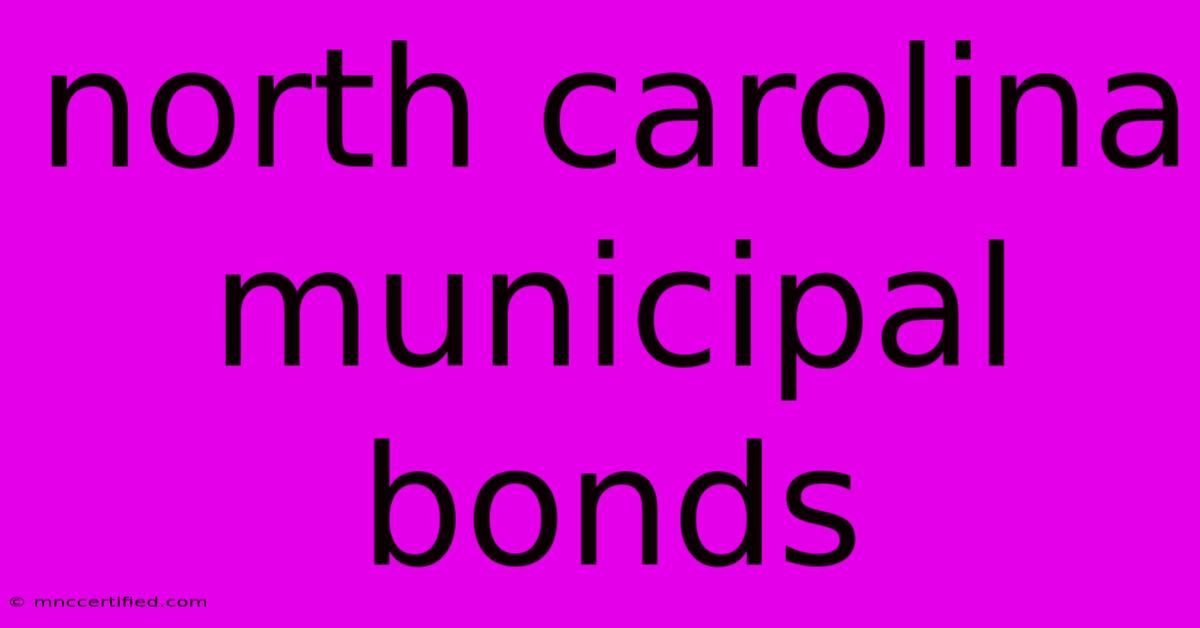North Carolina Municipal Bonds

Table of Contents
North Carolina Municipal Bonds: A Comprehensive Guide for Investors
North Carolina municipal bonds offer a compelling investment opportunity for those seeking tax-advantaged income. But understanding the nuances of these bonds is crucial before investing. This comprehensive guide will explore everything you need to know about North Carolina municipal bonds, from their tax benefits to potential risks.
Understanding North Carolina Municipal Bonds
Municipal bonds are debt securities issued by state and local governments, including cities, counties, and special districts, to finance public projects like schools, hospitals, roads, and bridges. North Carolina municipal bonds, specifically, are issued by entities within the state to fund similar projects. Investing in these bonds essentially means lending money to the issuing government entity. In return, you receive regular interest payments and the principal back at maturity.
Tax Advantages of NC Municipal Bonds
One of the most significant attractions of municipal bonds is their tax-advantaged status. Interest earned on most North Carolina municipal bonds is exempt from federal income tax. Furthermore, it's typically exempt from state and local taxes if you reside in North Carolina. This double tax exemption can significantly boost your after-tax return, making them attractive to investors in higher tax brackets. However, it's crucial to note that not all municipal bonds are created equal. Some bonds might be subject to the Alternative Minimum Tax (AMT), so careful due diligence is necessary.
Types of North Carolina Municipal Bonds
North Carolina offers various types of municipal bonds, each with its own risk and return profile:
- General Obligation (GO) Bonds: These bonds are backed by the full faith and credit of the issuing municipality. This means the government pledges its taxing power to repay the debt, making them generally considered safer investments.
- Revenue Bonds: These bonds are backed by the revenue generated from the specific project they finance, such as toll roads or water treatment plants. Their creditworthiness depends on the project's ability to generate sufficient revenue. These can carry higher risk but potentially higher yields.
- Special Tax Bonds: These bonds are repaid using specific taxes levied by the issuing municipality.
- Escrow Bonds: These secure obligations by setting aside funds in an escrow account to repay the bond.
Assessing the Risk of North Carolina Municipal Bonds
While generally considered relatively safe, North Carolina municipal bonds are not without risk:
- Credit Risk: The creditworthiness of the issuing entity directly impacts the bond's risk. A municipality's financial health, its ability to meet its debt obligations, and its overall economic outlook are all crucial factors. Credit rating agencies, such as Moody's, S&P, and Fitch, provide assessments of this risk.
- Interest Rate Risk: Like all fixed-income securities, municipal bonds are susceptible to interest rate risk. Rising interest rates can decrease the value of existing bonds.
- Inflation Risk: Inflation can erode the purchasing power of your investment returns.
- Liquidity Risk: Some municipal bonds might be less liquid than others, making it difficult to sell them quickly without incurring a loss.
How to Invest in North Carolina Municipal Bonds
Investing in North Carolina municipal bonds can be done through several avenues:
- Directly from the Issuer: You can purchase bonds directly from the issuing municipality, though this often involves larger minimum investment amounts.
- Through a Broker-Dealer: This is the most common method for individual investors. Broker-dealers provide access to a wider range of bonds and handle the purchase and sale transactions.
- Mutual Funds or ETFs: Investing in municipal bond mutual funds or exchange-traded funds (ETFs) provides diversification and professional management.
Finding Information on North Carolina Municipal Bonds
Before investing, conduct thorough research. Several resources can help:
- The North Carolina Department of State Treasurer: This department provides information on bond issuances and relevant regulations.
- Municipal Advisor Websites: Several financial advisors specialize in municipal bonds and offer resources and analysis.
- Credit Rating Agencies: Check the credit ratings of bonds before investing to understand their risk profile.
Conclusion
North Carolina municipal bonds offer a compelling investment option, particularly for residents seeking tax-advantaged income. However, understanding the different types of bonds, assessing their risk profiles, and carefully researching before investing are crucial for maximizing returns and minimizing potential losses. Remember to consult with a qualified financial advisor to determine if North Carolina municipal bonds align with your overall investment strategy and risk tolerance.
Disclaimer: This information is for educational purposes only and should not be considered investment advice. Consult with a qualified financial advisor before making any investment decisions.

Thank you for visiting our website wich cover about North Carolina Municipal Bonds. We hope the information provided has been useful to you. Feel free to contact us if you have any questions or need further assistance. See you next time and dont miss to bookmark.
Featured Posts
-
Lopetegui Makes Two West Ham Changes
Nov 26, 2024
-
Washington Huskies Beat Oregon State
Nov 26, 2024
-
Government Bonds Crossword Nyt
Nov 26, 2024
-
Cabarrus County 2024 Muni Bond
Nov 26, 2024
-
Will It Snow Thanksgiving Storm Outlook
Nov 26, 2024